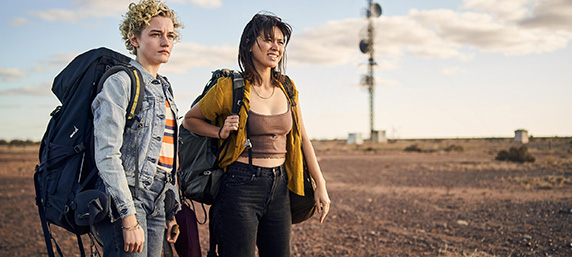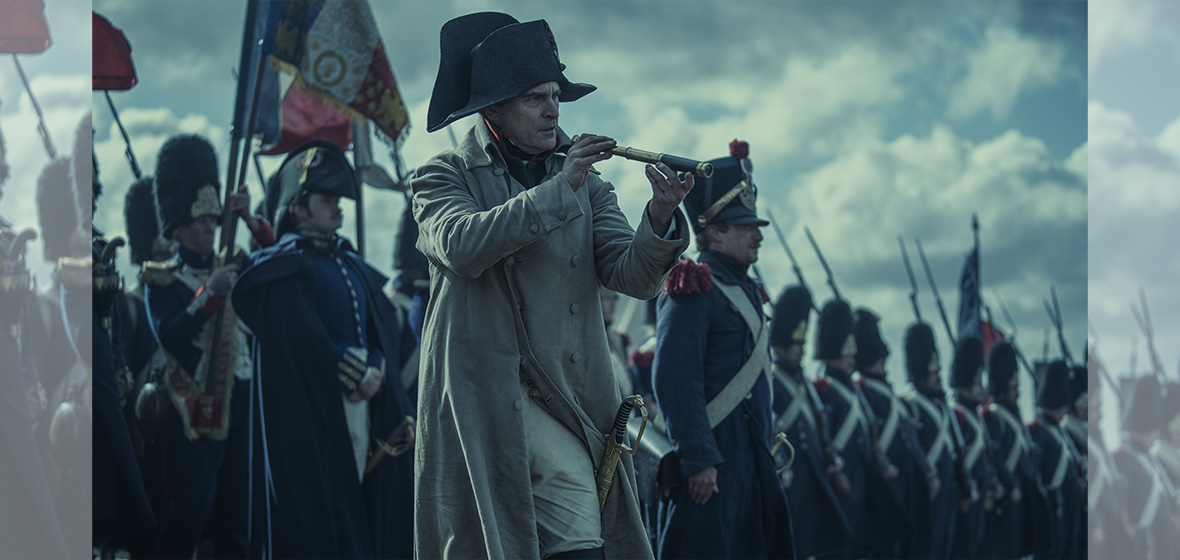Ticket giveaway
LSJand Transmission Films have 10 tickets to offer for the upcoming Anthony Hopkins drama One Life. The inspiring true story of Sir Nicholas ‘Nicky’ Winton, whose unsung endeavours on the eve of World War II saved more than 600 children from their doom at the hands of the Nazis. Fifty years later, it’s 1988 and Nicky is haunted by the fate of the children he wasn’t able to help. It’s not until he’s surprised by the survivors on live television that he can accept that when facing devastating atrocities, saving even one life is a victory, and the British public learn the truth about the hero hidden in their midst. Watch the trailer here.
For a chance to win one of the 10 double tickets, email your LawID and postal address to [email protected] with the subject line ONE LIFE.
Napoleon
For film nerds, Stanley Kubrick’s Napoleon is one of those “greatest films never made”. For decades it haunted the filmmaker who wrote more than 150 pages of script, scouted locations, cast the main roles, only to see the project die at the finish line because of production costs and the ultimate box-office failure of Sergei Bondarchuk’s Waterloo.
The subject became cursed. No one could ever make a film, with the scope it deserves, about one of the most exciting and divisive figures of history. No one except Ridley Scott, probably the last filmmaker with a genuine “I don’t care about any of your opinions” approach.
Napoleon is what you expect from a Ridley Scott epic – large, bloated, bubbling with ideas it tries to explore during its expected long runtime. Say what you will about Scott, he always swing for the fences, which is always worth celebrating.
Written by David Scarpa, Napoleon follows the rise and fall of Bonaparte (Joaquin Phoenix) from the decapitation of Marie-Antoinette until his demise in Saint Helena. It’s an account of the most important events, in his history, but told through the lens of his relationship with Josephine (Vanessa Kirby). Sure, we see Egypt and Austerlitz, his coronation, exile and Waterloo, but none of it seems to interest Scott and Scarpa as much as the dynamic with Josephine.
Scarpa adds sexual tension and smut to those scenes and Scott shoots them like an erotic comedy. The genius strategist transported into a primal animal moved by impulse, and it’s hilarious to see. In one of the film’s best moments, Napoleon walks in on Josephine changing, grunting like a horny beast, yearning to be tamed by his wife who proves to enjoy power as much as the emperor.
The big controversy is how Scott and Scarpa pay no attention to historical accuracy, but that doesn’t detract to what the film is trying to project. In fact it makes it engaging, and more truthful, that a lot of its episodes are not proven lies. Napoleon is told in the point of the view of his subject, down to his signature on the title sequence. At a certain point he meets with the Tsar of Russia, Alexander (Edouard Philipponnat), and tells him a story about negotiating a treaty with the English who have no honour. “That didn’t really happen, did it?” says the Tsar, unveiling that the same story, with the same punchline, exists in his country but about another kingdom. It doesn’t matter, says Bonaparte, the point is “the English have no honour”.
And that’s the message of Scott: it doesn’t really matter if Napoleon didn’t really blow the Sphynx’s nose. The legend is more interesting and exciting.
What does matters is that the film doesn’t have the emotional strength that it could have. In, again, classic Scott tradition, a lot feels like it was left on the cutting room floor. Sequences start with no segue, like he’s starting a new chapter mid-sentence with no build up. You never really get his ascension to power until things are offered to him, and his famed charisma doesn’t shine completely through. A lot, I suspect, was left out for brevity, so one day Scott can release a far superior director’s cut, like what he did with Kingdom of Heaven. Reportedly there is a four-hour long cut somewhere. At least this theatrical cut makes you wish there is one.
That said, Napoleon has enough cinema in it to hold it together. The battle scenes, though few, are tremendous – especially Austerlitz and Waterloo. The last third of the film, especially, taken mostly by Waterloo and the final exile – punctuated by how dull and uninteresting Wellington (Rupert Everett) is – works well, but to get there, a lot is left to be said.
Verdict: 3 out of 5
For history buffs who don’t take films too seriously, and everyone who wants to watch this so they can better compare to the, I bet, vastly superior director’s cut we will undoubtedly one day get.

The Royal Hotel
There is a story set in the premiere of the Australian classic Wake In Fright where someone indignantly shouted halfway through “That’s not us” to which actor Jack Thompson replied “shut up, it is us”. Watching The Royal Hotel reminded me of that anecdote and how Australians still struggle to come to terms with the least favourable aspects of its society. Speaking as an immigrant with a very non-anglo name, that “us” leads to constant micro-aggressions.
Directed by Kitty Green, who made her name in the industry with the 2019 not-so-subtle drama about workplace sexual abuse The Assistant, adapts to fiction the cult documentary Hotel Coolgardie. In it a camera crew follows two Finnish female backpackers to a remote WA mining town to work in a pub, as they face the intensity of a male-centric primal community. Green changes the protagonists to Americans pretending to be Canadians, Hanna (Julia Garner) and Liv (Jessica Henwick), and reshapes the story of the documentary to fit the beats of an intense thriller, complete with well-defined villains and a worthy climax.
In this version the girls find themselves in Sydney with no money and accept a placement in a mining town in the middle of nowhere. They meet Billy (Hugo Weaving), the pub owner, his partner Carol (Ursula Yovich) and a range of drunk and violent men who all prey on the girls that come to the town for a real Australian experience. Right on the first night, Hanna and Liv witness the chaos that lives in the pub, and seeing the previous workers, two British backpackers, descending to debauchery, Liv comments “this will be us in a couple of months” to a shocked Hanna.
Green never explains much about the girl’s past, hinting ever so slightly at a traumatic event. But it’s none of our business. Their personal circumstances neither explain, nor justify, the abuse they cop from the people in the pub. Instead Green populates the script with little Australian quirks to amuse a knowledgable audience – in a moment a girl asks for a Fosters in a pub, a patron asks for a “Dickens Cider” and one of the potential love interests, Matty (Toby Wallace), cheekily offers Hanna a “gay time”. The familiarity disarms the audience who understands the culture being portrayed, only to yank the rug from their feet during the intense second half.
Familiar ground for one is a nightmare to others. Green shoots The Royal Hotel like she’s uncovering an open secret. There are all these shots from inside of cupboards, or looking out through a window. Like she’s literally opening a door to a reality the country has collectively forgotten about in the dark corner of a cupboard. The rampant alcoholism is rampant and unaddressed by the population, the few interactions with Indigenous people are loaded and uncomfortable. Everyone who isn’t white, Australian, and male, cops aggression to various degrees, in full view of everyone.
The problem is that Green doesn’t go far on her scathing critique of Australiana. There is a little detachment from the problem, like she’s pointing at rural Australia and saying that the problem is over there, not inherent to the whole country. It would’ve been just as easy to show the kernels of this rotten core in the prologue, in Sydney. Instead the city is seen as the solution, the end of the girl’s problems. As long as they can make their way back to Sydney, all their problems will be solved. It’s an unintentional privileged take, and one that undermines the overall message of the film.
The Royal Hotel is an important film. For Australians it taps on the unspoken violence in the country’s psyche, for non-Australians it breaks the mould of the colonial dream the country projects to the rest of the world. It fails at addressing how these issues are not just endemic to the harsh heart of the country, but it reminds us the importance of being introspective.
Verdict: 3½ out of 5
For those who squirm whenever they hear “Aussie Aussie Aussie”.




